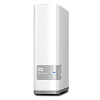Western Digital My Cloud User Manual - Page 44
Information Icons, Information icons are at the top right of every
 |
View all Western Digital My Cloud manuals
Add to My Manuals
Save this manual to your list of manuals |
Page 44 highlights
AT A GLANCE: THE DASHBOARD Information Icons Information icons are at the top right of every page. Icon Name USB device on the WD My Cloud Actions Click to display the number of USB devices connected (a hub with multiple devices can be connected to the USB port. Icon is dim if there is no USB attached. Alerts Click to display recent alerts about new firmware and network issues. Critical alerts Click to display a severe warning: over temperature, under temperature, drive SMART failure, failure of the data volume to mount. Help Click to display a menu of ways of obtaining help. Navigation Icons Navigation icons display across the top of every page. Icon Name Home Users Actions Provides a snapshot of the My WD Cloud's status, capacity, current firmware, and the number of user, shares, and connected tablet and mobile devices. Create user accounts and grant them full or limited access to particular shares. Shares Create shares and grant specific users full, read only, or no access to particular shares Cloud Access Safepoints Settings Enable/disable remote cloud access for users, generate device access codes for users to connect remotely to their personal cloud, and monitor remote access status. Create safepoints on either a USB drive attached to the WD My Cloud drive or on a different storage device within your network. Enable/disable cloud access for the device. Configure advanced settings for Internet connections, wireless connections, storage, drives, system administration, security, the local network (LAN), and firmware updates. WD MY CLOUD PERSONAL CLOUD STORAGE 39 USER MANUAL















